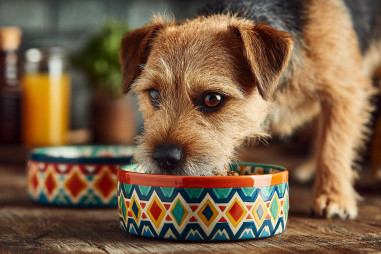Knowing the average life expectancy of your Border Terrier is more than just a number—it’s a valuable insight that helps you provide the best care for your furry friend throughout their life. Border Terriers are sprightly, affectionate dogs known for their intelligence and adaptability. Understanding their lifespan and the factors that can influence it allows you to promote a long, healthy, and happy life for your companion. In this article, we’ll explore what you can expect regarding the Border Terrier life expectancy, the role of diet, exercise, and healthcare, plus how to support your pet’s emotional wellbeing as they age gracefully.
Average Lifespan of Border Terriers
Border Terriers typically have a lifespan ranging from 12 to 15 years, with some living even longer with proper care. This is relatively long compared to many other breeds, reflecting their generally robust health and energetic nature. Like all dogs, individual longevity can vary depending on genetics, environment, lifestyle, and medical care. Knowing that your Border Terrier can be your companion for well over a decade helps you plan for the long-term commitment of nurturing their health.
Factors Affecting Longevity
Several factors influence how long a Border Terrier will live. Genetics play a significant role, as some lines may be prone to specific hereditary health issues while others enjoy naturally strong constitutions. Environmental factors, including living conditions and exposure to hazards, also impact overall health.
Moreover, lifestyle choices such as diet, exercise, and routine veterinary care can dramatically improve or shorten your dog’s lifespan. Early detection and management of health conditions like hip dysplasia, dental disease, or heart problems contribute significantly to longevity. Additionally, the emotional connection and social environment your Border Terrier experiences can affect their quality of life and overall health resilience.
Impact of Diet and Exercise
A balanced diet tailored to the nutritional needs of Border Terriers is fundamental in supporting their health and longevity. Providing high-quality dog food that meets their age, size, and activity level ensures they receive the necessary nutrients without excess calories that could lead to obesity.
Exercise is equally crucial. Border Terriers are active dogs that thrive on daily physical activities, such as walks, playtime, and mental stimulation through training or puzzle toys. Regular exercise helps maintain a healthy weight, supports cardiovascular health, strengthens muscles and joints, and reduces behavioral issues that can stem from boredom or stress.
Combining a nutritious diet with consistent exercise helps prevent many health problems while enhancing vitality and longevity.
Preventive Healthcare
Routine veterinary care is vital in catching potential health problems early before they develop into serious conditions. Annual health checks, vaccinations, parasite prevention, and dental cleanings form the foundation of preventive healthcare. Border Terriers benefit from regular monitoring for breed-specific conditions, such as patellar luxation (knee issues) and skin allergies.
Regular blood work and screenings as your dog ages can uncover health changes, facilitating timely intervention. Maintaining a good relationship with your vet and adhering to recommended healthcare schedules is one of the best investments you can make in extending your Border Terrier’s life.
Signs of Aging in Dogs
As Border Terriers grow older, you may notice physical and behavioral signs indicating they are entering their senior years. These signs include:
- Reduced energy and playfulness
- Stiffness or difficulty moving, especially after rest
- Graying fur around the muzzle and face
- Changes in appetite or eating habits
- Increased sleeping or a preference for quiet spaces
- Decline in vision or hearing
- Development of lumps or skin changes
Recognizing these changes early allows for adjustments to care routines that accommodate your Border Terrier’s evolving needs.
Adapting Care for Senior Border Terriers
When your Border Terrier becomes a senior, typically around 8 to 10 years of age, adapting their care is essential to maintain their comfort and health. This may include:
- Adjusting diet to a formula designed for older dogs with lower calories but balanced nutrition
- Modifying exercise to gentle walks and low-impact activities to prevent joint strain
- Providing orthopedic beds or supportive cushions for joint comfort
- Ensuring easy access to food, water, and favorite resting spots to accommodate lowered mobility
- Scheduling more frequent veterinary visits to monitor chronic conditions or emerging health issues
- Offering dental care tailored to older teeth and gums
These changes not only enhance physical health but also show your dog that comfort and love remain a priority throughout their golden years.
Emotional Wellbeing and Quality of Life
Just as physical health is critical, attending to your Border Terrier’s emotional wellbeing is equally important. Dogs thrive on companionship, mental stimulation, and a predictable routine. Even as seniors, Border Terriers benefit from interactive play, gentle training exercises, and social interaction with family members or other dogs.
Reducing stressors, such as loud noises or sudden changes, and providing a safe, loving environment helps maintain their emotional balance. Quality of life includes the joy and contentment your dog experiences daily, so observe your pet for signs of discomfort or distress and respond accordingly.
Engage with your Border Terrier affectionately, use positive reinforcement, and celebrate each day together, fostering a bond that enriches both your lives.
Understanding the typical life expectancy of Border Terriers and the numerous factors that influence it empowers you to care for your dog proactively and compassionately. By offering a balanced diet, regular exercise, preventive healthcare, and attention to emotional needs, you maximize the chance that your Border Terrier will live a long, healthy, and joyful life. Cherish every moment with your loyal companion—it’s these shared experiences that truly define the gift of pet ownership.







